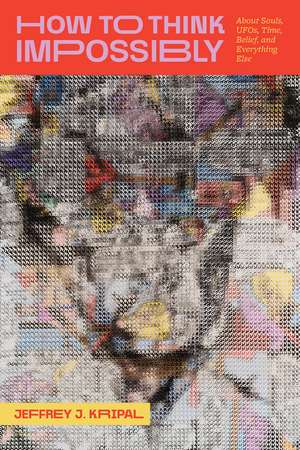How to Think Impossibly: About Souls, UFOs, Time, Belief, and Everything Else
Autor Jeffrey J. Kripalen Limba Engleză Hardback – 26 iul 2024
From precognitive dreams and telepathic visions to near-death experiences, UFO encounters, and beyond, so-called impossible phenomena are not supposed to happen. But they do happen—all the time. Jeffrey J. Kripal asserts that the impossible is a function not of reality but of our everchanging assumptions about what is real. How to Think Impossibly invites us to think about these fantastic (yet commonplace) experiences as an essential part of being human, expressive of a deeply shared reality that is neither mental nor material but gives rise to both. Thinking with specific individuals and their extraordinary experiences in vulnerable, open, and often humorous ways, Kripal interweaves humanistic and scientific inquiry to foster an awareness that the fantastic is real, the supernatural is super natural, and the impossible is possible.
Preț: 232.60 lei
Nou
Puncte Express: 349
Preț estimativ în valută:
44.51€ • 46.47$ • 36.84£
44.51€ • 46.47$ • 36.84£
Carte disponibilă
Livrare economică 15-29 martie
Livrare express 01-07 martie pentru 33.69 lei
Preluare comenzi: 021 569.72.76
Specificații
ISBN-13: 9780226833682
ISBN-10: 0226833682
Pagini: 312
Ilustrații: 1 halftones
Dimensiuni: 152 x 229 x 25 mm
Greutate: 0.54 kg
Ediția:First Edition
Editura: University of Chicago Press
Colecția University of Chicago Press
ISBN-10: 0226833682
Pagini: 312
Ilustrații: 1 halftones
Dimensiuni: 152 x 229 x 25 mm
Greutate: 0.54 kg
Ediția:First Edition
Editura: University of Chicago Press
Colecția University of Chicago Press
Notă biografică
Jeffrey J. Kripal holds the J. Newton Rayzor Chair in Philosophy and Religious Thought at Rice University. He is the author of several books, including, most recently, The Superhumanities: Historical Precedents, Moral Objections, New Realities, also published by the University of Chicago Press.
Cuprins
Prologue. Knowledge before Its Time
Introduction. The Fantastic Foundations of Reality
Part One. When the Impossible Happens
1. Words Are Experiences: Evolutionary Origins and the World of the Dead
2. Why They Don’t Land: Mantis, Mystical Theology, and Social Criticism
3. “That They Are Not Human”: Thinking on the Autistic Spectrum
Part Two. Making the Impossible Possible
4. The Timeswerve: Theorizing in a Block Universe
5. The World Is One, and the Human Is Two: Some Tentative Conclusions
6. We Are God (and the Devil): Further Thoughts and Moral Objections
Conclusion. How to Think Impossibly
Epilogue. The Three Bars
Acknowledgments. A Sociology of the Impossible
Notes
Index
Introduction. The Fantastic Foundations of Reality
Part One. When the Impossible Happens
1. Words Are Experiences: Evolutionary Origins and the World of the Dead
2. Why They Don’t Land: Mantis, Mystical Theology, and Social Criticism
3. “That They Are Not Human”: Thinking on the Autistic Spectrum
Part Two. Making the Impossible Possible
4. The Timeswerve: Theorizing in a Block Universe
5. The World Is One, and the Human Is Two: Some Tentative Conclusions
6. We Are God (and the Devil): Further Thoughts and Moral Objections
Conclusion. How to Think Impossibly
Epilogue. The Three Bars
Acknowledgments. A Sociology of the Impossible
Notes
Index
Recenzii
"Jeffrey J. Kripal’s How to Think Impossibly boldly goes where most scholars fear to tread."
"Kripal bravely dives into fundamental questions, and he offers mind-stretching possibilities as a result."
"Kripal’s latest book is an intellectual route-map toward exploring authentic anomalous, paranormal and mystical experiences ostracized by orthodox science."
"A bold effort to grapple with the notion that people who experience the impossible might actually be telling the truth . . . It is also a set of proposals about how we could begin to understand reality once the impossible has been accepted into our understanding of the universe."
"To ‘think-with’ the ‘experiencers’ of such things [as UFO encounters] means treating them as enquirers who can change how history is written. . . . Whether our sources tell us our subjects spoke with Venusians, the Virgin Mary or Kali does not matter: their experiences were valid expressions of their neurology, not their beliefs. They were ‘ontological shocks’, which reveal that consciousness is or might become less bounded than we now suppose it to be. . . Kripal’s sensitive retellings of what his contactees endured show we cannot just write them off as mad or delirious."
"Kripal is not your run-of-the-mill historian of religion."
“This daring book offers a serious challenge to many of the dogmatic assumptions that govern the humanities, our understanding of religion, and—most significantly—our conceptions of reality. Kripal’s ideas call for nothing less than a quantum leap beyond the paradigms that shape our thinking about what is possible or impossible. His philosophy is as bold as it is compelling, and the cogency of his arguments is intensified by prose that packs a vigorous punch. Kripal has a gift for conveying very complex ideas succinctly, bringing abstractions out of their ether and connecting dots that have long needed connecting.”
"Read this book if you want to make sense of how apparently impossible events do sometimes occur and how uncanny connections can arise between quantum physics and religious mysticism."
"If I am to be provoked, I’d want it to be by a book like this one. How to Think Impossibly asks us to take seriously (but not solemnly) notions that reason would have us reject: to contemplate compassionately, humanely, and broadly the quiddities of human experience. Kripal’s book is the best kind: not an instruction manual on what to believe but an invitation to the imagination. Frankly, I don’t know what I think about it—but I want to think about it.”
"Kripal inspires and provokes us to rethink what we imagine can and cannot be. Winding his way through accounts of encounters with demons, flying saints, precognitive dreams, clairvoyant visions, near-death experiences, and alien intruders, he invites us to take seriously the fantastic and exotic. Alternately outrageous, whimsical, weird, and startling, How to Think Impossibly offers a breathtaking adventure into the world and meaning of wonders."
